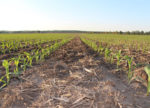Advertise Follow Us
Items Tagged with 'EQIP'
ARTICLES
Capitalize on Conservation with Funding Programs
Whether it’s through the government, carbon markets or private companies, a number of opportunities can help no-tillers adopt regenerative ag practices profitably.
Read More
Women Landowners Arm for Conservation Push
Growing number of women landowners seek role in land operational decisions, helped by federally funded outreach programs.
Read More











